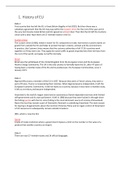Resume
European Law SUMMARY
- Cours
- European Law
- Établissement
- Karel De Grote-Hogeschool (KdG)
This is a summary of European Law. This summary is made of the lecturer's explanation and the PowerPoints. Chapters: 1. History of EU 2. EU Institutions 3. Sources of EU Law 4. The Basic Freedoms
[Montrer plus]



